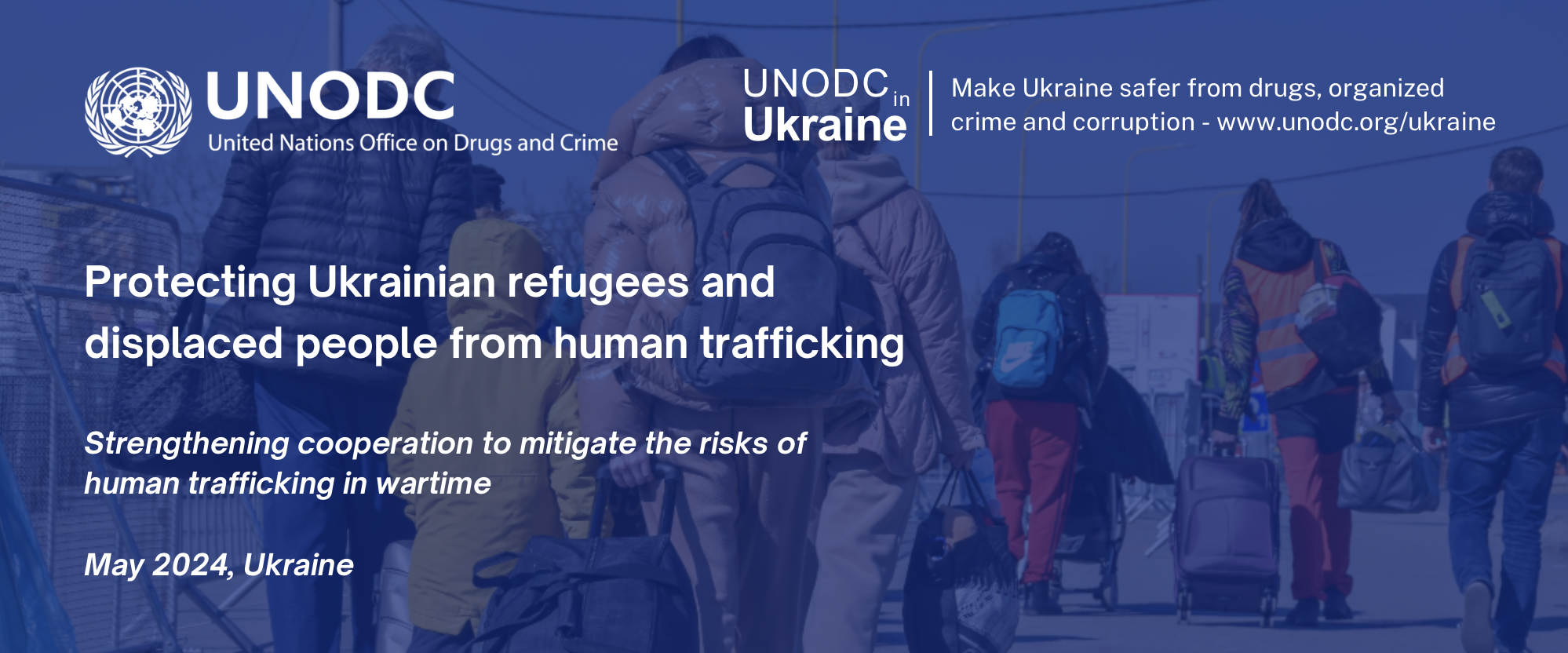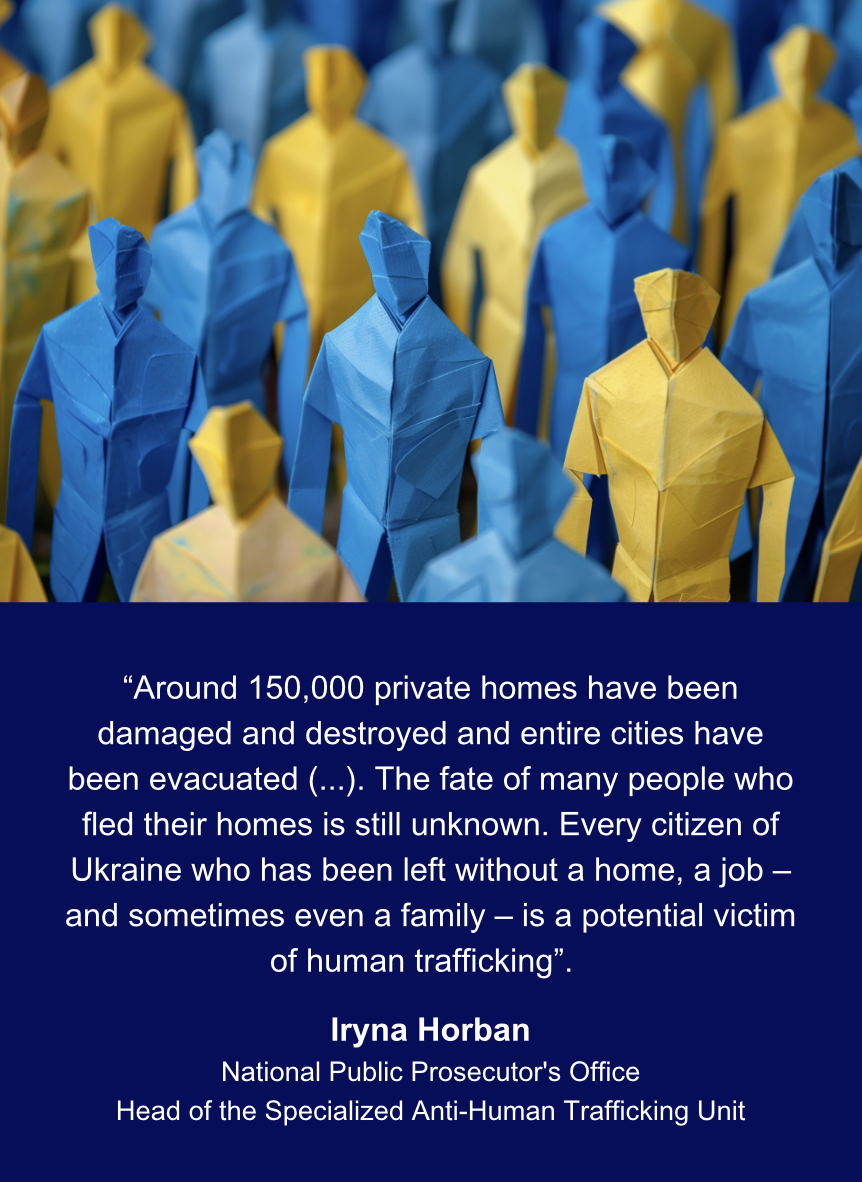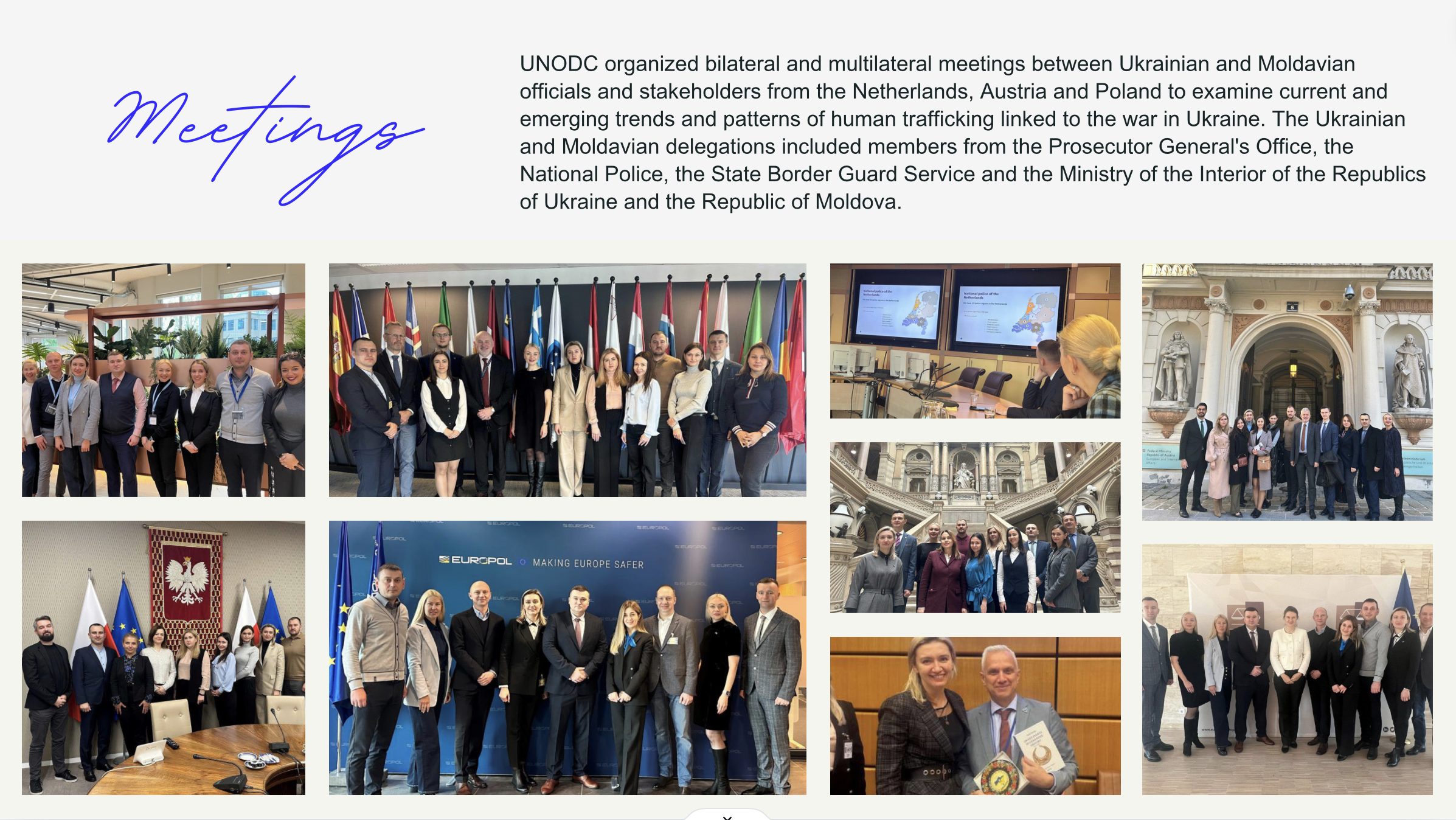
May 2024, Ukraine – The conflict in Ukraine poses significant risks for the security and safety of people fleeing the country, increasing their vulnerability to human trafficking. Since February 2022, UN estimates that over six million people have fled Ukraine as refugees and some four million have been internally displaced, many of them children (UNHCR Ukraine Refugee Situation). While the risks of trafficking begin in Ukraine, they continue beyond the borders of front-line EU member states and Moldova.
To address the current and emerging risks of human trafficking and protect the vulnerabilities of people fleeing Ukraine, the United Nations Office on Drugs and Crime (UNODC), its office in Ukraine and UNODC HTMSS (Human Trafficking and Migrant Smuggling Section) have joined forces with the governments of the Netherlands, Austria and Poland, who welcomed Ukrainian and Moldovan authorities for a Study Tour on "Addressing current and emerging trends and patterns of trafficking in persons (TIP) related to the war in Ukraine".
Discussions focused on the need for Ukraine and Moldova to cooperate with European states to strengthen a range of key functions to mitigate the risks of human trafficking due to the major challenges associated with the large-scale invasion, including the displacement of almost a third of the Ukrainian population, the reduction in Ukrainian capacity due to the detour of resources and personnel to the humanitarian response, and the risk of corruption within the police and judiciary, which can encourage trafficking and exacerbate impunity for trafficking-related offences.


The Government of Ukraine is supported by UNODC in Ukraine and UNODC HTMSS, which have expanded anti-human trafficking activities and team of experts in the country since 2023, training hundreds of law enforcement officers, prosecutors and judges in the investigation and prosecution of all aspects of the human trafficking process, starting with the detection of cases, the collection of evidence, investigating and prosecuting and securing convictions, and assistance to potential victims, in line with the National Action Plan to Combat Human Trafficking (read our webstory ‘Strengthening the national response on identifying cases and referring victims of human trafficking among Ukrainians on the move’).
These officials are located all around the country, including those from the newly established Coordination Centre for Victim Support within the Office of the Prosecutor General and the Specialized Anti-Human Trafficking Unit. “Our main goal is to implement a new victim-oriented investigation mechanisms to prevent the re-traumatization of human trafficking victims.” stated Ms Iryna Horban, from the Prosecutor General's office of Ukraine and Head of the Specialized Anti-Human Trafficking Unit. (Read our webstory ‘UNODC joins forces with prosecutors' offices in the Dnipropetrovsk, Donetsk and Odesa regions to support anti-trafficking efforts across Ukraine’).
Due to the war, TIP cases related to Ukrainian refugees and displaced persons are on the rise. In Poland and Moldova, where thousands of Ukrainians are fleeing the war and from where reports of cross-border trafficking, including sex trafficking, of refugees have been reported, it is crucial to put in place actions addressing the mid-and longer-term impact of the conflict on TIP and victims’ needs, as well as put forward transnational initiatives to reduce the vulnerability of people fleeing Ukraine and to prevent them from being exploited by traffickers.
“One of the major challenges facing the authorities is to identify and certify the official status of a greater number of victims to ensure that they benefit from appropriate assistance and support and have access to the rights they are entitled to under EU law and the Ukrainian trafficking law (natlex.ilo.org). We managed to gather specialised officers on prevention, detection and combatting trafficking in persons from the border control, police, prosecution and judicial authorities,” explained Anastasiia Pryimak, UNODC Project Officer in Kyiv. “Through these contacts, Ukrainian officials have developed a cooperative approach including with Moldova to identifying (potential) victims and screen victims of trafficking among highly vulnerable populations.”
Ukrainian and Moldovan officials successfully exchanged with Dutch, Austrian and Polish authorities on how to strengthen deterrence, capacity-building based on improved investigative and prosecutorial approaches, and accountability mechanisms, and on how to offer emergency assistance such as accommodation, transport, medical assistance and childcare to ensure the safety of the most vulnerable, notably through new partnerships with EU governments, international institutions, NGOs and civil society organizations.

Further information
UNODC
https://www.unodc.org/unodc/human-trafficking/
Latest UNODC Global Report on Trafficking in Persons
UNODC Research (December 2022). Conflict in Ukraine: Key Evidence on Risks of Trafficking in Persons and Smuggling of Migrants, update 2022: https://www.unodc.org/documents/data-and-analysis/tip/Conflict_Ukraine_TIP_2022.pdf
World Anti-Trafficking Day 2024 (30.07): This year's global campaign urges accelerated action to end child trafficking. Thematic 2024: "Leave No Child Behind in the Fight Against Human Trafficking".
Intervention/Study Tour
Activities undertaken to address human trafficking in Ukraine in 2023 as well as the Study Visit were supported financially by the Government of Japan.
Study Tour in October and November 2023 - The Ukrainian and Moldavian delegations included members from the Prosecutor General's Office, the National Police, the State Border Guard Service and the Ministry of the Interior of the Republics of Ukraine and the Republic of Moldova. The Netherlands, Austrian and Polish governments hosted the Study Tour in presence of the Ukrainian and Moldavian delegations and key national and European stakeholders including:
16-19 October 2023 The Netherlands - Europe, Eurojust, The Hague Police, Dutch National Rapporteur on Trafficking in Human Beings and Sexual Violence against Children, La Strada International, EMEA.
4-9 November 2023 Austria - the Austrian Attorney General's Office, the Austrian Criminal Intelligence Service's Joint Operational Office for Combating Human Trafficking and Smuggling, the Government Working Group on Combating Human Trafficking. Poland - Frontex, the Polish Ministry of the Interior and Administration's Anti-Trafficking Team, the Polish National Prosecutor's Office and the National Counseling and Intervention Center for Victims of Human Trafficking (KCIK).
International Partnerships
UNODC has also supported the country to work with the European Union Agency for Criminal Justice Cooperation (Eurojust), the European Union Agency for Law Enforcement Cooperation (Europol) and Frontex on cases of human trafficking among refugees, as well as cross-border cooperation to prevent this crime and support victims.